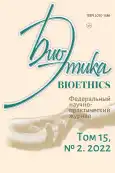Вопросы обучения иностранных студентов в медицинских вузах в период пандемии COVID-19
- Авторы: Альшук Н.А.1, Аль-Атум Х.2
-
Учреждения:
- Волгоградский государственный медицинский университет
- Иорданский университет Петра
- Выпуск: Том 15, № 2 (2022)
- Страницы: 37-42
- Раздел: Практическая биоэтика
- URL: https://journals.rcsi.science/2070-1586/article/view/114776
- DOI: https://doi.org/10.19163/2070-1586-2022-15-2-37-42
- ID: 114776
Цитировать
Полный текст
Аннотация
Введение. Пандемия нового коронавируса COVID-19 сказалась на всех сторонах жизни современного общества. Не является исключением и сфера высшего медицинского образования. Закрытие границ многими государствами создало ситуацию, когда обучение в другой стране стало возможном только в виртуальном формате. Как это сказалось на его качестве, станет ясно впоследствии. Но эффективность работы в данной сфере во многом зависит от принятия или непринятия студентами новых форм обучения. Изучению этого вопроса было посвящено исследование, проведенное Управлением по международным связям Волгоградского государственного медицинского университета в феврале-апреле 2021 г.
Цель. Определить перспективы применения смешанного формата обучения студентов медицинских вузов в постковидный период для оптимизации освоения образовательных программ и укрепления международного сотрудничества в этой области.
Методы. Полевое исследование включало анкетирование с применением Googl-форм. Обработка анкет машинная. Проведено редактирование и кодирование информации, статистический анализ, компаративный анализ, комбинаторный анализ с использованием программы SPSS. Исследование проводилось в медицинских университетах 8 стран разных регионов мира. В статье обсуждены его результаты по России. Генеральная совокупность – 1835 иностранных обучающихся на 01 марта 2021 г. N = 320. Достоверность – 97 %.
Гипотеза исследования. Переход на онлайн-обучение в период пандемии позволяет студентам реализовать возможности непрерывного медицинского образования. В целом они хорошо адаптируются в цифровой среде, однако ее недостатком считают отсутствие непосредственного руководства преподавателями, формирования практических навыков и невозможность личных контактов. В перспективе формат онлайн-обучения может рассматриваться как вспомогательный, но не основной в подготовке врачей.
Результаты. Разработаны практические рекомендации по развитию международных связей в высшем медицинском образовании с применением смешанных методов обучения, как в норме, так и в чрезвычайных ситуациях.
Заключение. Полученные результаты позволяют сделать вывод о том, что учеба в зарубежном медицинском университете оценивается студентами выше, чем образование в собственной стране, они больше ценят полученные знания и выбирают те формы обучения, которые наиболее выгодны для их профессионального развития.
Полный текст
Открыть статью на сайте журналаОб авторах
Наталья Александровна Альшук
Волгоградский государственный медицинский университет
Автор, ответственный за переписку.
Email: nalshuk@volgmu.ru
ORCID iD: 0000-0001-5657-575X
преподаватель кафедры философии, биоэтики и права с курсом социологии медицины
Россия, ВолгоградХусам Аль-Атум
Иорданский университет Петра
Email: husam02@mail.ru
ORCID iD: 0000-0002-0897-0656
кандидат философских наук, доцент факультета массовых коммуникаций
Иордания, АмманСписок литературы
- Medical students’ knowledge, attitudes, and practices regarding electronic learning. URL: https://journals.plos.org/ plosone/article?id=10.1371/journal.pone.0242905.
- Medical education in times of COVID-19: German students’ expectations – A cross-sectional study. URL: https://journals. plos.org/plosone/article?id=10.1371/journal.pone.0241660.
- Consolidation in a crisis: Patterns of international collaboration in early COVID-19 research. URL: https://journals.plos.org/ plosone/article?id=10.1371/journal.pone.0236307.
- Alshuk N.A. International students at Russian medical school: t he ethics of communication before and during the COVID-19 pandemic. URL: https://www.elibrary.ru/ item.asp?id=45710647.
Дополнительные файлы







